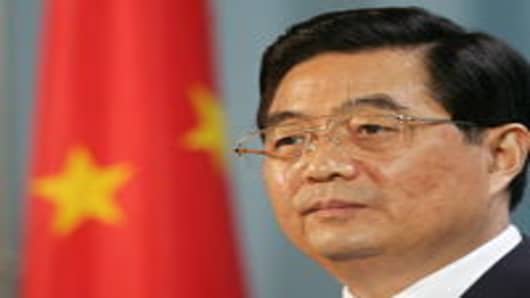China’s president, Hu Jintao, on Sunday pledged an “even more active” opening up of the country’s economy and a renewed commitment to free trade as he sought to respond to concerns over apparent reform fatigue in Beijing and a deteriorating global economy.
Addressing an audience of business leaders and senior trade officials in a speech to mark the 10th anniversary of China’s accession to the World Trade Organisation, Mr Hu pledged to pursue more balanced foreign trade relations and to create a fair and transparent business environment.
China, he said, would seek to strengthen the rule of law, reduce government interference in economic activities, and improve the enforcement of intellectual property rights.
“[We will] carry out an even more active opening strategy [and] expand into new areas for opening up,” he said.
The Chinese leader’s commitment to more balanced trade was meant to address the main source of disruption in Beijing’s trade relations with the U.S., which has long pushed China to allow its currency to appreciate at a faster pace against the dollar.
The rise in the renminbi has slowed to a crawl in recent months as a drop-off in demand in mature economies has hit Chinese exports. New trade data released on Saturday showed China’s exports grew 13.8 per cent in November from a year earlier, slowing from a 15.9 per cent increase in October. Imports grew 22.1 per cent year-on-year, less than the 28.7 per cent rise a month earlier, in another sign of weakening in the domestic economy.
Mr Hu said China would not deliberately pursue a trade surplus. Beijing, he said, would give imports and exports equal weight and increase economic co-operation with those countries that are the main sources of China’s trade surplus.
He also held out hope that Chinese demand for goods could play a role in any recovery of the global economy. China’s total imports would exceed $8 trillion in the next five years, according to estimates, and that “will bring enormous opportunities to countries around the world.”
Mr Hu’s promises for an opening up of the Chinese economy come amid complaints by foreign businesses that after an unprecedented run following its WTO accession, China has become less welcoming to foreign investors.
One area of criticism has been that Beijing often requires foreign companies to share technology with Chinese companies as an “entry ticket” to the local market, only to then face competition from local rivals, as seen in the energy sector. Multinationals also complain of being discriminated against in Chinese procurement of technology products on national security grounds.
Speaking at the same forum on Sunday, Pascal Lamy, the WTO director-general, praised China for its moves to open up its eonomy following WTO accession, But he appealed to Beijing to continue the process. “The pace of that reform is a topic of debate within and outside China,” he said.
China’s trade surplus is set to decline in 2011 for the third straight year and is on track to be about half the size of the record $298 billion surplus in 2008. That would amount to less than 3 per cent of gross domestic product, suggesting that China’s trade relationship with the rest of the world is increasingly balanced.
Critics in the U.S. continue to point to their country’s yawning trade deficit with China as evidence of Beijing’s unfair support for its exporters, especially through what they allege is an artificially cheap renminbi.
But the U.S. deficit with China appears to be more the result of the global trade structure than Chinese policy distortions. As a major processing hub in the global supply chain, China runs large bilateral trade deficits with producers of raw materials and large bilateral surpluses with importers of finished products.


